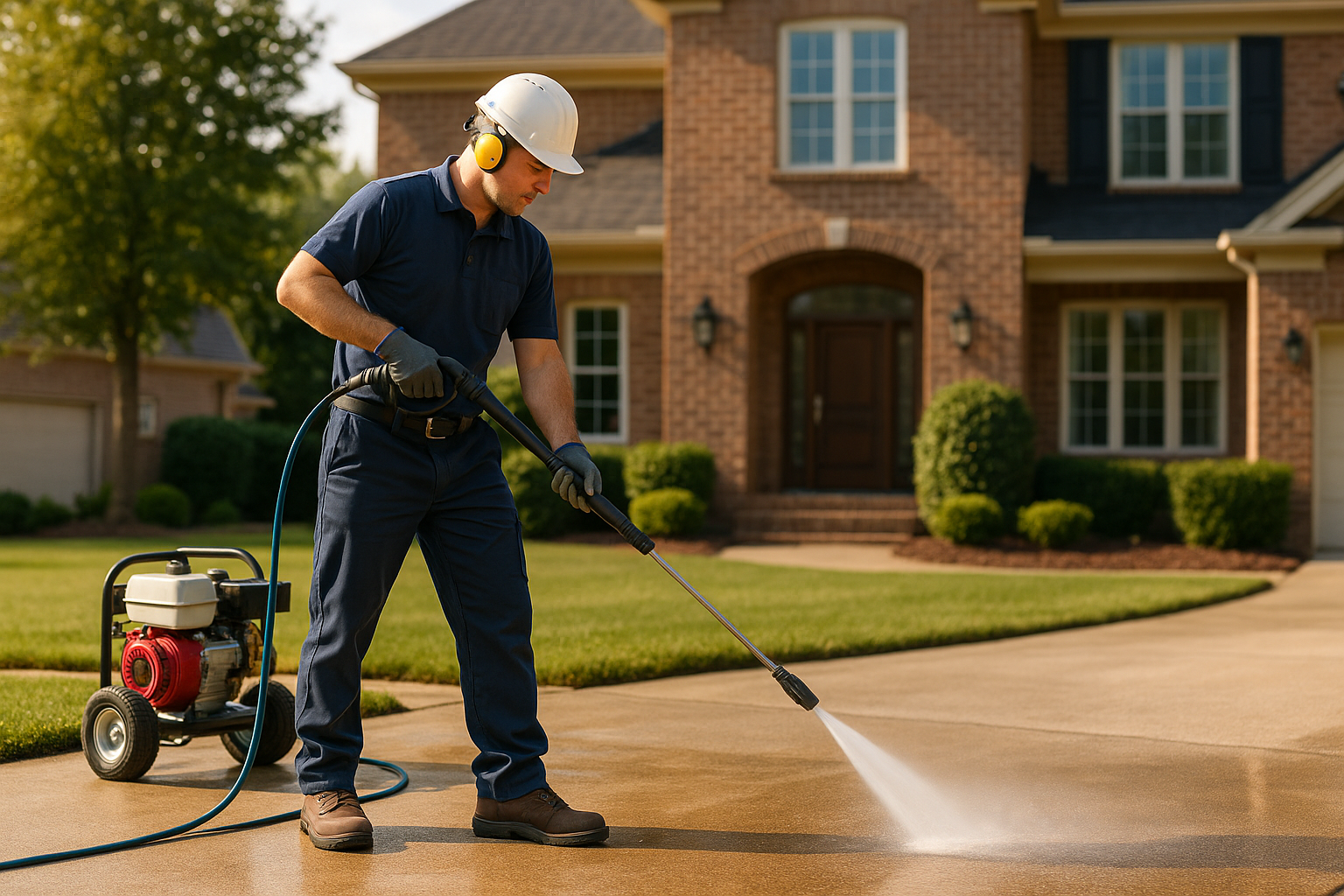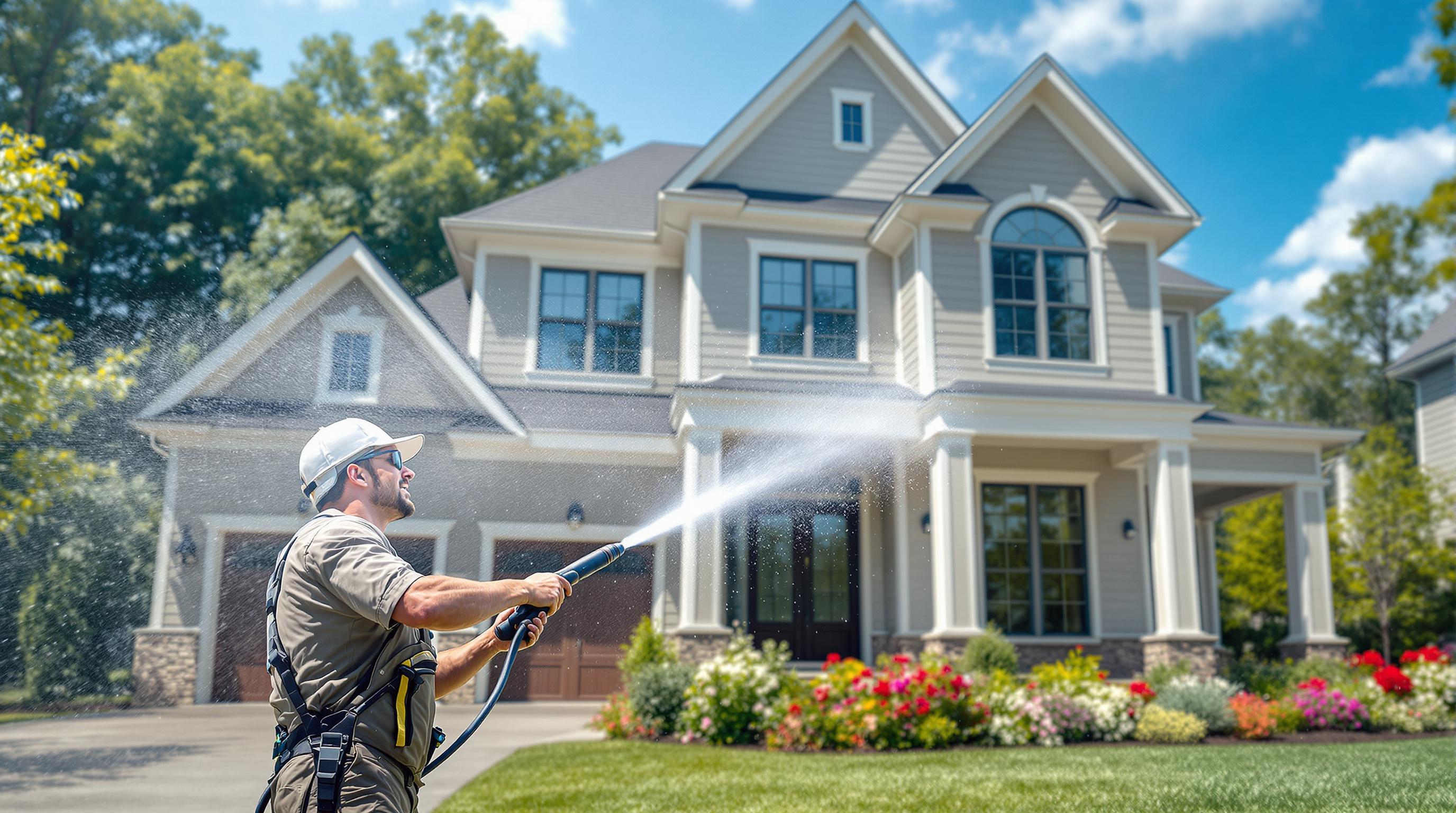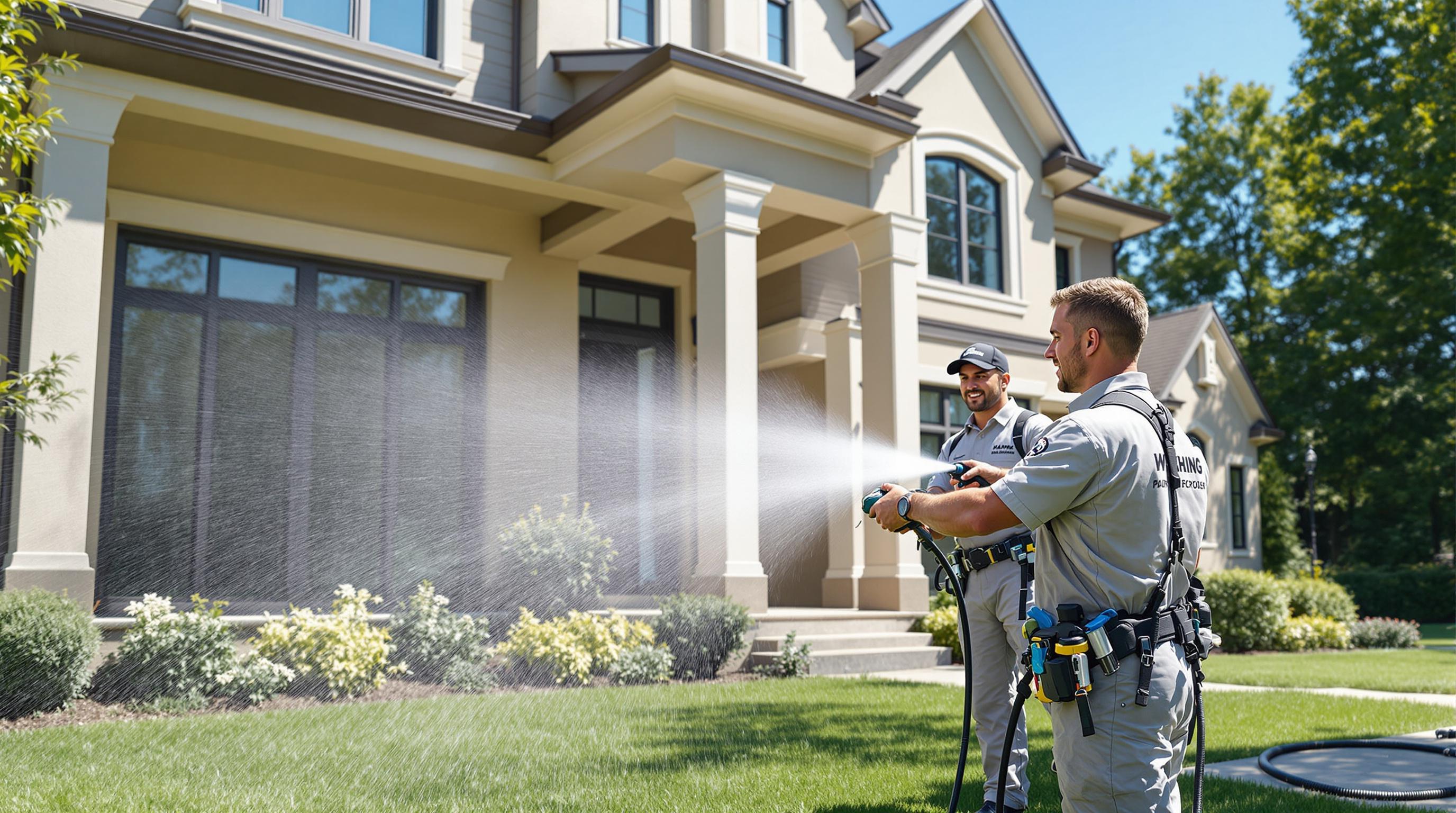Want to remove rust stains quickly and safely? Pressure washing is one of the most effective methods to clean rust from outdoor surfaces like concrete, brick, and metal. Here's a quick summary of how to do it right:
- Identify the rust source: Common culprits include metal furniture, irrigation systems, or fertilizers.
- Choose the right tools: Use a pressure washer (2,000-3,000 PSI for concrete, 1,500-2,000 PSI for delicate materials) and a suitable nozzle (15°, 25°, or 40°).
- Apply cleaning products: Use oxalic acid for tough stains, citric acid for lighter ones, or white vinegar for mild spots.
- Protect surfaces: Prep the area by clearing debris and covering plants or nearby items.
- Wash effectively: Start with low pressure, maintain a steady distance, and work in overlapping strokes.
- Prevent future stains: Apply a protective sealer after cleaning.
For large or stubborn stains, consider hiring professionals like Pressure Washing Cary NC, who specialize in safe, efficient rust removal.
Pressure Washing Tips: Rust stain on siding | Pressure ...
What Causes Rust Stains
Understanding where rust stains come from helps you tackle them more effectively with pressure washing. Rust stains usually form when metal objects, iron-rich water, or certain fertilizers repeatedly come into contact with outdoor surfaces.
Common Sources of Rust
Metal objects are often to blame for rust stains on exterior surfaces. Here are some frequent contributors:
- Metal furniture and fixtures: Items like iron or steel tables, chairs, light fixtures, and decorative pieces.
- Irrigation systems: Sprinklers that use water containing high levels of iron, which can leave rust stains on nearby surfaces.
- Lawn equipment: Metal tools, such as mowers and trimmers, that can cause rust marks when exposed to moisture.
- Construction materials: Nails, screws, or other metal debris left on surfaces like concrete.
- Fertilizers: Certain fertilizers include iron, which can create rust stains on hard surfaces when wet.
Recognizing these sources can help you choose safer and more precise cleaning methods.
Surfaces Commonly Affected
Different surfaces react to rust stains in varying ways, so cleaning methods should match the material. Here's a quick breakdown:
| Surface Type | Characteristics | Rust Impact |
|---|---|---|
| Concrete | Porous material | Absorbs rust, requiring stronger cleaning methods. |
| Brick | Textured surface | Rust can settle in mortar joints and crevices. |
| Vinyl Siding | Smooth surface | Rust usually stays on the surface, making it easier to clean. |
| Wood | Natural material | Tends to develop deeper stains, needing gentler cleaning. |
Once you've identified the rust sources and affected surfaces, you can gather the right tools to remove the stains effectively.
Required Equipment
Make sure you have the right tools and gear to handle rust stains effectively with a pressure washer.
Pressure Washer Setup
- A pressure washer with:
- 2,000-3,000 PSI for concrete surfaces
- 1,500-2,000 PSI for more delicate materials
- Nozzle options:
- 15-degree yellow nozzle: For tough stains
- 25-degree green nozzle: For general cleaning
- 40-degree white nozzle: For delicate surfaces
- A 50-foot hose with compatible fittings
- A surface cleaner attachment for large areas like driveways
Cleaning Products
The right cleaning solutions can make rust removal easier:
| Product Type | Best For | Application Method |
|---|---|---|
| Oxalic Acid | Deep, tough stains | Pre-treatment spray |
| Citric Acid | Light rust | Direct application |
| Commercial Rust Remover | General use | Follow label |
| White Vinegar | Mild stains | Pre-soak solution |
Tip: Always test any cleaner on a small, hidden spot before full application to avoid unexpected damage.
Safety Equipment
Protect yourself while using pressure washers and cleaning chemicals with the following:
- Safety goggles (ANSI Z87.1-certified)
- Chemical-resistant gloves
- Non-slip, water-resistant boots
- Long sleeves and pants made from water-resistant fabric
- N95 mask for handling chemicals
- First Aid Kit for emergencies
Additional Tools and Supplies
- Stiff-bristled brush
- Clean rags or towels
- Plastic sheeting for protecting nearby areas
- Garden hose for rinsing
- pH test strips to check surface neutrality
Store your equipment in a dry, safe place, away from kids and pets. Regular maintenance of your tools will ensure they stay in good working condition. Once you’re set up, you can move on to preparing the surface for rust removal.
Rust Removal Steps
Surface Prep
Get the surface ready before starting:
- Clear away debris, furniture, and any obstacles in the area.
- Protect plants, electrical outlets, and nearby surfaces with plastic sheeting.
- Check for loose areas, peeling coatings, or sealants that might interfere with cleaning.
- Mark the rust stain boundaries for better visibility.
- Sweep the surface thoroughly to remove dirt and dust.
If you're working with metal, look for any active corrosion that might spread during cleaning.
Once everything is set, you can move on to the washing process.
Washing Technique
Start with low pressure and adjust as needed:
- Use a 40-degree white nozzle, keeping it about 2 feet away from the surface.
- Hold the wand at a 45° angle to avoid damaging the material.
- Work in overlapping strokes, moving from top to bottom.
- Keep the nozzle at a steady distance and maintain consistent pressure.
- If necessary, switch to a stronger nozzle for stubborn stains.
For larger areas like driveways, a surface cleaner attachment can save time. Always keep the surface wet to stop the cleaning solution from drying out.
After washing, follow up with these final steps.
Final Steps
- Rinse the surface thoroughly with clean water using the 40-degree nozzle.
- Test the surface pH to ensure it's neutral.
- Let the area dry completely (24-48 hours), then check for any remaining rust.
- Apply a proper sealer to help prevent future stains.
Avoid pressure washing under direct sunlight or when temperatures are below 40°F (4.4°C). If the rust is tough to remove or the surface is delicate, you might want to reach out to professional pressure washing services for help.
sbb-itb-8e2a680
Safety Guidelines
Safety should always come first when pressure washing rust stains. Start by reviewing the manufacturer’s instructions for your equipment and cleaning solutions. Be sure to wear proper personal protective equipment (PPE), including gloves, eye protection, and a respirator, especially when working with chemicals.
High-pressure water can cause severe injuries, so handle the equipment carefully. Work in a well-ventilated area to minimize exposure to chemical fumes. Also, make sure to keep children and pets out of the work zone to avoid accidental contact with high-pressure water or cleaning agents.
If at any point the task feels hazardous or you're unsure about how to proceed, stop immediately and consider reaching out to a professional for assistance.
Rust Prevention Tips
After cleaning, take steps to stop rust from returning. Start by applying a protective sealant to surfaces prone to rust. For concrete, use a penetrating silane/siloxane sealer. This type of sealer helps repel water while still allowing the concrete to breathe. Always follow the manufacturer's instructions to ensure the best results.
If you're tackling a large project or unsure about the right coating to use, consider reaching out to experts like Pressure Washing Cary NC (https://pressurewashingcarync.com) for professional advice and durable solutions.
Professional Help
Handling minor rust spots on your own can work, but for extensive or tricky stains, it’s best to bring in the pros. Companies like Pressure Washing Cary NC use specialized tools and methods to get the job done right.
When Should You Call the Experts?
- Rust stains covering large areas, such as driveways, patios, or building exteriors
- Stains that don’t budge after multiple DIY attempts
- Surfaces that require extra care, like natural stone or decorative concrete
- Commercial properties that need regular cleaning and upkeep
In these cases, professional help is often safer and more effective. Experts know how to assess the situation and choose the best tools and techniques to remove stains without damaging surfaces. They use precise pressure settings and specialized rust removers to restore your property.
Added Safety and Insurance Coverage
Pressure Washing Cary NC provides insurance coverage with their services, ensuring your property is protected during the cleaning process.
A Smart Long-Term Investment
Hiring professionals isn’t just about convenience - it’s a smart way to protect your property. Here’s why:
- They use high-grade equipment for efficient stain removal
- Protective treatments help prevent stains from coming back
- Maintenance tips from experts keep your property looking great
For ongoing care or tough rust stains, working with Pressure Washing Cary NC offers lasting results. Many customers find that professional cleaning not only restores their property but also helps preserve its value over time.
Summary
Getting rid of rust stains with pressure washing requires the right tools, careful techniques, and attention to safety. Here's what you need to know for successful rust stain removal:
Equipment and Safety
- Use the correct pressure washer settings and rust removal solutions.
- Wear protective gear and test cleaning solutions on a small, inconspicuous area first.
- Follow safety guidelines throughout the process.
Once you've got the right tools and safety measures in place, follow these steps to tackle rust stains effectively:
Treatment Steps
- Prepare the surface thoroughly before starting.
- Apply rust removers with steady pressure, keeping the right distance from the surface.
- Finish by applying a protective sealant to help prevent future stains.
For tough stains or larger cleaning jobs, hiring professionals can make a big difference. Pressure Washing Cary NC's team uses industrial-grade tools and specialized methods to deliver excellent results. Their process includes:
- Assessing the condition of the surface.
- Customizing cleaning solutions for specific needs.
- Applying protective treatments to reduce the risk of rust returning.
- Expertly cleaning delicate materials without causing damage.
Here’s what one customer had to say about their experience:
"I have never been so impressed with a company. They arrived early did exactly what they said they were going to do. And I couldn't be more pleased. Their prices were awesome and the work was So good my neighbors have come out and ask for cards. I guess that says at all.." - Carolyn C.
Addressing rust stains promptly with the right techniques not only avoids expensive repairs but also keeps your property looking its best.


